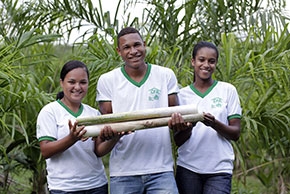International Distinction
International Education Meeting presents the impact of Rural Family Houses in the rural zone of the Bahia Southern Lowlands
1 de October de 2014
International Education Meeting presents the impact of Rural Family Houses in the rural zone of the Bahia Southern Lowlands
1 de October de 2014

September 5 and 6 marked the International 360 Education Meeting, held at the Rio de Janeiro Social Service of Commerce (SESC) School. The event was organized by the newspapers O Globo and Extra in partnership with SESC and the Rio de Janeiro City Government, with support offered by the television channel Canal Futura. The meeting promoted a discussion on education with aims of encouraging debate, the sharing of innovative visions and experiences that were successful in terms of learning and to serve as inspiration for the necessary transformation of the current Brazilian education scenario.
Among the expert conferences headed by social scientists Edgar Morin and Pierre Levy, together with lectures and exhibits, one of the case study groups focused on the topic of how the Rural Family Homes impact the rural zone of the Bahia Southern Lowlands, which use the Trade-Off Pedagogy. Based on the method adopted, the youth – children of family farmers – spent one week learning full-time, with both classroom study (theoretical) and field study (practical), together with two weeks on the family’s property, applying the new knowledge learned. These teaching units offer Professional Education courses with a technological focus for natural resources (agriculture, agribusiness and forests) and are part of the Bahia Southern Lowlands Environmental Protection Area Mosaic Program for Development and Growth Integrated with Sustainability (PDCIS), supported by the Odebrecht Foundation with the support of public and private partners.
During the event, Joana Almeida, Educational Advisor for the Odebrecht Foundation, presented the challenge faced by PDCIS, with a focus on actions geared toward the training of rural entrepreneurs. “We seek to ensure that the students are always simultaneously integrated with their families, the school and the community, given that, once that have accepted the methodological structure applied, they tend to stay engaged with the educational environment,” said Almeida. She further clarified that the integrated curriculum was created to meet these needs, in which the trade-off of themes are integrative, not limited to a succession of practical and theoretical training times at the different spaces, but which create a close connection and interaction between the two, in addition to reflective work about the experience. The idea is to train young rural entrepreneurs who can then take control of their own destiny. “We want to leverage the wealth they can obtain in the rural area and promote the development of agriculture,” said Almeida. In 2014 alone, over 90 students completed the training, which takes three years.
One successful example of this work is Benivaldo dos Santos, age 26, an agricultural technician and former student at the Presidente Tancredo Neves Rural Family Home (CFR-PTN). He also participated in the event. Santos revealed that at the institution, he found opportunities that influenced his way of thinking and acting and which were transformed into results. “Today, I’m a reference in the region,” he said. “I owe this to the discipline and ethical values I learned.” Santos added that, when he completed the course in 2010, he continued to grow his crops and became a member of the Presidente Tancredo Neves Rural Producers’ Cooperative (COOPATAN). “This way, I know exactly where my production is going and receive a greater financial return.”
For Sandra Sanches, Executive Director of O Globo, Education 360 was yet another important chapter in the efforts to promote quality teaching and learning in the country. “The initiative has become part of our calendar of events, reinforcing our commitment to informing and developing readers and citizens.”
Do you wish to be
a partner in our projects, make
a donation or hire our technical consulting?
Send a message
right now!